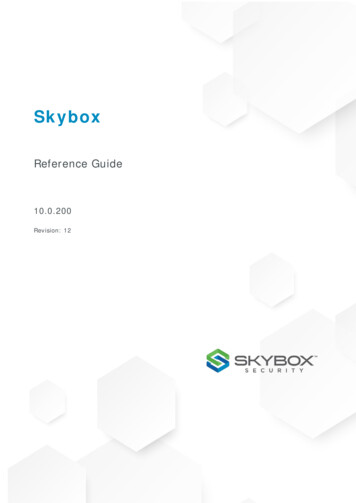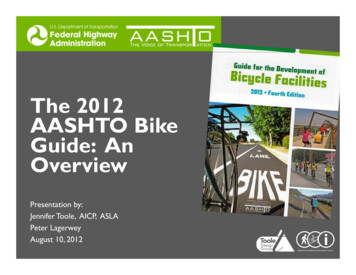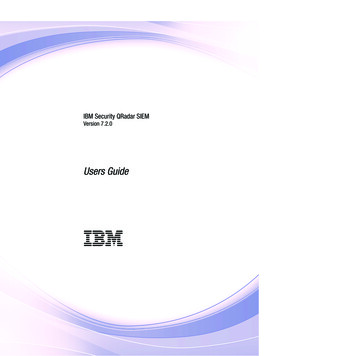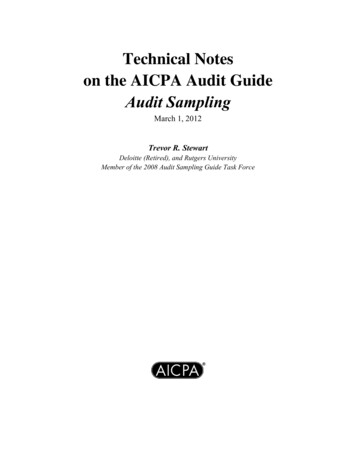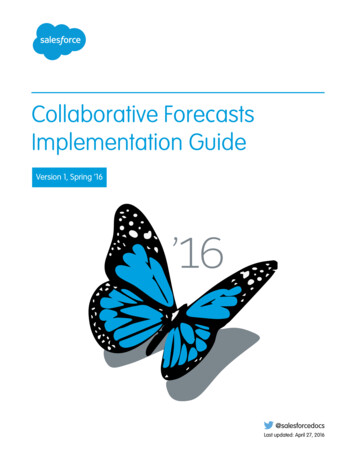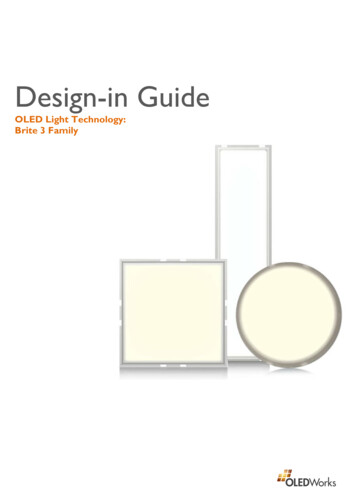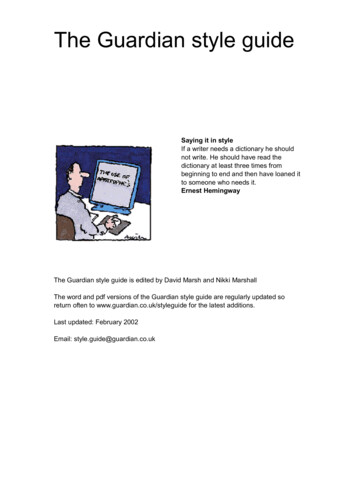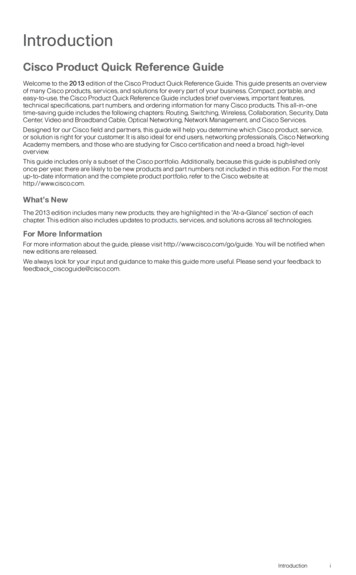
Transcription
Plain English Campaign: The A to Z guide to legal phrasesCopyright Plain English CampaignThe A to Z guide to legal phrasesThis is only a basic guide. If you have any suggestions, corrections orimprovements, please contact us. You can contact us at:PO Box 3New MillsHigh PeakSK22 4QP.Phone: 01663 744409Fax: 01663 747038Email: info@plainenglish.co.ukWebsite: www.plainenglish.co.ukCopyrightPlain English Campaign owns the copyright to this guide. You can save one copy ofthe guide to disk, and print one copy out for your personal use. You must not makemore than one copy without our permission.
IntroductionThe language used in law is changing. Many lawyers are now adopting a plainEnglish style. But there are still legal phrases that baffle non-lawyers.This guide is intended to help in two ways: it should help non-lawyers understand legal phrases; and it should give lawyers ideas for explaining the legal phrases that they use.The explanations in this guide are not intended to be straight alternatives.Although we hope the explanations will prompt lawyers to make sure they onlyuse legal jargon where strictly necessary, our wording is there to explain ideasand concepts rather than to give strict legal definitions.The terms and explanations are for the law in England and Wales.This is very much a 'work in progress', and we welcome any corrections,clarifications or suggested additions. Please email us with your comments.The copyright on this guide belongs to Plain English Campaign. Please contactus if you want to reproduce any part of it.AAbandonmentgiving up a legal right.Abatement is:cancelling a writ or action;stopping a nuisance;reducing the payments to creditors in proportion, ifthere is not enough money to pay them in full; orreducing the bequests in a will, in proportion, whenthere is not enough money to pay them in full.Abductiontaking someone away by force.Ab initiofrom the start of something. (This phrase is Latin.)Abovementioneddescribing something which has been referred tobefore in the document.Abscondwhen a person fails to present themselves before thecourt when required, such as when they have beenreleased on bail and not returned to court.
Absolutecomplete and unconditional.Absolute dischargesomeone who has been convicted of an offencebeing released without any penalty. (They may stillhave to pay compensation though.)Absolute ownerthe only owner of property such as equipment,buildings, land or vehicles.Absolute privilegea defence which can be used in a case ofdefamation if the statement from which thedefamation arose was: made in Parliament; in fair and accurate news reporting of courtproceedings; or made during court proceedings.Abstract of titlea document, drawn up by the seller, summarising thetitle deeds to a property (such as a house).Abuse of processwhen criminal proceedings are brought against aperson without there being any good reason and withmalice.Abuttalsthe parts of the boundaries of a piece of land whichtouch pieces of land alongside.Acceptancewhen an offer is accepted unconditionally and alegally binding agreement is created.Acceptance of servicewhen a solicitor accepts a writ on behalf of a client.Acceptorthe organisation (such as a bank) which will pay thecheque or bill of exchange it has accepted.Accessorysomeone who encourages or helps another personto commit a crime.Accomplicesomeone who helps another person to commit acrime.Accordinglya word used in legal documents which meanstherefore or so.Accountsthe record of an organisation's income, spending andfinancial situation.
Accumulationreinvesting income generated by a fund back into thefund.Accusedthe person charged with a criminal offence.Acknowledgementadmitting that someone has a claim or admitting thata debt exists.Acknowledgement ofServicewhen a defendant agrees that a writ or originatingsummons ('claim form' since April 1999) has beenreceived. The defendant fills in, signs and sendsback the acknowledgement of service to confirm inwriting that the documents were received.Acquitwhen a court lets a person go without any penalty. Ifa court decides that a person is not guilty of a crime,or the case has not been proved, it will acquit theperson.Acquittalthe court's decision that a person is innocent of thecrime they were charged with.Actionusing the law to make a claim.Active trusta trust where the trustees have other responsibilitiesrather than to just let the beneficiaries have thetrust's assets when they ask for them.Act of bankruptcyan act which, if carried out by a person with debts,could have led to bankruptcy proceedings againstthat person.Act of Godan extreme naturally occurring event (such as anearthquake, avalanche or flood) that could not havebeen anticipated.Actual bodily harmhurting another person but less severely than wouldamount to grievous bodily harm.Actual lossan insurance term which means that the insured itemno longer exists.
Actuaryan expert on pension scheme assets and liabilities,life expectancy and probabilities (the likelihood ofthings happening) for insurance purposes. Anactuary works out whether enough money is beingpaid into a pension scheme to pay the pensionswhen they are due.Actus reusan act which is illegal, such as theft. (This term isLatin.)Additional voluntarycontribution (AVC)extra money people in occupational pensionschemes can pay in to increase their pensionbenefits.Ademptionwhen a gift in a will cannot be made because theitem no longer exists.Ad hocfor a particular purpose. For example, a committeeset up to deal with a particular situation is an ad hoccommittee. (This term is Latin.)Ad idem- in agreement. (This term is Latin.)Ad infinitumAdjourned sine dieendlessly or forever. (This term is Latin.)when a court case has no date fixed for it tocontinue.Adjournmentpostponing a court hearing.Adjudge/adjudicateto give an official judgement about something. Forexample, if someone cannot pay their debts a courtmay adjudge them bankrupt.Adjudication orderthe former name for a court order which madesomeone bankrupt. It has now been replaced withthe term bankruptcy order.Administration orderan order made by a county court when a person or acompany cannot pay their debts. Normally the courtorders that the debts are repaid by instalments and aslong as the debtor keeps to the order the creditorscannot do anything else to recover their money.
AdministratorAdmissibility ofEvidenceAdmissionAdmonition.Adoptionsomeone who has been appointed:to manage theaffairs of a bankrupt business; or to manage theestate of someone who has died without leaving awill.which evidence can be presented in court. Evidencemust be relevant to the case but even some relevantevidence cannot be presented, such as hearsay orevidence of little value. The judge decides whether ornot evidence can be used in the case.one side in a case agreeing that something the otherside has alleged is true.reprimanding of a defendant by a judge even thoughthe case against the defendant has been discharged(dropped).the system which people use to become parents,even though they are not the child's natural parents.Adoptive childa child who has been legally adopted.Adoptive parenta person who has legally adopted a child.Ad valoremin proportion to the value. An ad valorem duty goesup as the value of the goods, shares and so on that itis charged on rises. (This term is Latin.)Adverse possessionintentionally occupying land to prevent the rightfulowner or tenant using it.Adverse witnessa witness who gives evidence which damages thecase of the side which asked the witness to testify forthem.Advocateis: Affidavitthe lawyer who speaks in court for a client; ora Scottish lawyer who is the equivalent of abarrister in England and Wales.a written statement which is sworn to be true by theperson signing it. It is sworn before someoneauthorised by the court.
Affirmto: solemnly promise to tell the truth in court;solemnly promise to tell the truth in anaffidavit;confirm a decision made by a lower court;orallow a contract to continue even though itcould have been cancelled because it wasfundamentally breached.Affirmationsolemnly promising to tell the truth when givingevidence. It is an alternative to swearing an oathwhen the person giving evidence does not wish to.Affrayfighting unlawfully. It is a criminal offence.Aforementioneddescribing something referred to previously in thedocument.Aforesaiddescribing something which has been said orreferred to before in the document.Agencythe relationship between a principal and an agent.Agentsomeone appointed to act for a principal.Age of consentthe age when someone can consent to have sexualintercourse. In the UK it is 16.Aggravated assaulta more serious type of assault such as one leadingto actual bodily harm.Aggravated burglaryentering premises armed with a weapon, intending tosteal goods.Aggravated damagesextra damages awarded because the defendant hascaused the victim anguish, loss of self-respect orshame.Aggravated vehicle takingstealing a vehicle, driving it dangerously and as aresult injuring someone or damaging property.
Agricultural holdinga type of tenancy agreement for someone doingagricultural work. The tenant has special rightsincluding, when the tenancy finishes, the right tocompensation for improvements to the land. If theland has deteriorated the tenant must compensatethe landlord.Aiding and abettinghelping someone to commit a crime.Airspacethe space in the atmosphere directly above a pieceof land. If you own a piece of land you also own theairspace above the land.Aliasa false name.Alibia claim that a person was elsewhere when a crimewas committed. If someone is accused of a crimetheir alibi is: evidence that the person was somewhere elsewhen the crime was committed; or an attempt to prove that the person wassomewhere else when the crime wascommitted.Aliensomeone from a foreign country.Alienationtransferring the ownership of property from oneperson to another.All and sundryeverybody.Allegationan unproved statement declaring that something hashappened.Alleviateto lessen or reduce.Allocation ratethe proportion of money left to be invested aftercharges have been taken off when money is paidinto a fund (such as a pension fund). For example, ifthe charges were 2%, the allocation rate would be98%.Allotmentshares allocated to a buyer. An allotment of sharesin a company gives the owner (of the allotment) anunconditional right to buy the shares at a fixed price.
All thatwords used in a conveyance to introduce thedescription of the property which is being conveyed.Alternate directora person appointed by a director to take thedirector's place.Alternative verdicta person being found guilty of a less serious crimethan the one they were charged with. If a moreserious charge has not been proved and thedefendant has been found not guilty, the defendantmay be found guilty of a less serious crime instead.For example, there may not be enough evidence toconvict someone of a murder but there may still beenough for a manslaughter conviction. This is knownas an alternative verdict.two or more companies combining.AmalgamationAmbiguitycapability of more than one meaning. When astatement's meaning is not clear because it iscapable of more than one meaning, it contains anambiguity.Ambulatory willa will which can be revoked or changed while theperson who made it is still living.Amnestynot punishing a person for an offence they havecommitted and removing details of the offence fromthe court's records is giving the person an amnesty.Ancient lightsthe right not to have the light you receive from aneighbour's land blocked.Annual accountsthe summary of an organisation's financialtransactions during the year covered by theiraccounts, and a 'snapshot' of the assets andliabilities at the end of the year.Annual generalMeetingAnnual returnthe yearly meeting of the members of anorganisation which must be held to meet legalconditions. The annual accounts are presented forapproval at this meeting.a return which must be sent by companies to theRegistrar of Companies. Each year the officers of acompany have to fill in an annual return with details
of the members, officers, shares issued and otherinformation about the company. The return is thensent to Companies House for filing and is availablefor inspection by members of the public.Annuitantthe person who gets paid an annuity.Annuityan amount paid out every year to someone. Themoney usually comes from an insurance policy. Itcan be split up into smaller amounts and be paid outmore frequently, such as monthly. It is usually paidfor the rest of the beneficiary's life.Annulto cancel: an invalid marriage; or a bankruptcy order.Antebefore. (This is a Latin word.)Antecedentsdetails about the past of a defendant or a personfound guilty of a crime. The information aboutprevious crimes, background and bad behaviour isgiven to the court before the sentence is given.Antenuptial agreementa legal agreement between two people who areabout to get married. The agreement sets out howthe couple's assets will be divided between them ifthey later divorce.Anton Piller orderan order by the High Court. It gives the applicantpermission to search the defendant's premises forevidence, inspect it and take it away. It is intended toprevent evidence being destroyed or hidden whichwould be relevant to the case. (Since April 1999, thishas been known as a 'search order'.)Appealasking a court to overturn a lower court's decision. Ifthe decision of a court is disputed it may be possibleto ask a higher court to consider the case again bylodging an appeal.Appellantthe person who is appealing to a court against adecision of a lower court.Appellate jurisdictionthe authority a court has to hear an appeal against adecision made by a lower court.
Appertaining toApplicantthe person asking a court to do something.Appointeethe person who gets the benefit of the use of apower of appointment.Appointorthe person who uses a power of appointment.Appurtenancesminor rights in land such as a right to do somethingon the land.Arbitrageis: borrowing money at a low rate of interest tolend out again at a higher rate; orbuying and selling in different markets to makeprofits out of the price differences.Arbitrationsettling a dispute by using a referee. If a disputegoes to arbitration it is settled by an independentreferee. It avoids having to use the courts to settlethe dispute.Arbitratorthe independent referee who settles a disputewithout the need to use the courts.Arraignmenta procedure at the start of a trial when details of theoffences are read out and the defendants are askedwhether they will plead guilty or not guilty.Arrestto seize someone, usually because they aresuspected of committing a crime, and take them intocustody.Arrestable offencea crime for which a person may be arrested without awarrant being needed.Arsonsetting fire to something to cause damage to it.Articlesthe clauses in a document. A company's articles setout its rules. The articles form part of thememorandum and articles of association.Articles of associationdocuments which set out a company's rules.Assaultwhen someone threatens another person withphysical harm. Words on their own do not amount to
assault but threatening gestures do, even if theperson threatened is not touched.Assenta document used by personal representatives totransfer property to a beneficiary.Assetsomething owned such as a building, a vehicle ormoney in the bank.Assignto formally transfer something, such as whenownership of property is transferred from one personto another.Assignmentthe formal transfer of the rights to something. Anexample would be a bank customer assigning to thebank the right to receive the benefits from a lifeinsurance policy to give the bank security for a loan.Assuranceinsurance cover for an event which will definitelyhappen, such as death.Assureto transfer the ownership of something.Assuredthe person whose life is insured or who is entitled toreceive the benefit from the assurance cover.Assured shortholdTenancya type of tenancy agreement under which the landlordhas the right to take the property back at the end ofthe tenancy agreement.Attachment of earningsa court order that deductions be made from aperson's earnings. The employer pays the moneycollected to the court and the court pays the moneyto the people it is owed to.Attestto sign to witness a signature on a document.Attorneya person appointed to act for another person (suchas when someone cannot look after their ownaffairs). A formal document called a power ofattorney is used to appoint the attorney.It is also the name used for a US lawyer.
Attorney Generalthe chief legal adviser to the Government. He or shemust be a Member of Parliament (or have a seat inthe House of Lords) and must be a barrister.Auditan independent examination of an organisation'srecords and financial statements (report andaccounts) to make sure that: the financial statements show a fair reflectionof the financial position at the accounting date; the income and spending is shown accurately; the financial statements meet any legalconditions; and the financial statements are drawn up clearly.Auditor's reporta report and opinion, by an independent person orfirm, on an organisation's financial records.Authorised shareCapitalAuthorisedInvestmentsAutopsythe highest amount of share capital that a companycan issue. The amount is set out in the company'smemorandum of association.investments in which a trustee is permitted to investtrust money, under an Act of Parliament.an examination of a dead body to find the cause ofdeath.BBailto pay, or promise to pay, an amount of money sothat an accused person is not put in prison beforethe trial. If the accused person does not appear atthe trial, the court can keep the money put up forbail.Baileea person or organisation looking after valuable itemsto keep them safe for the owner.Bail hostelaccommodation found for people charged withoffences and released on bail, but who do not have apermanent address so that the police know where tofind them.
Bailiffan officer of the court who carries out the court'sorders, such as taking a debtor's goods and sellingthem to get money to pay the debtor's debts. A bailiffcan also personally deliver (serve) documents onpeople.Bailiwickthe area over which a bailiff has jurisdiction.Bailmenttransferring possession of goods from the owner tosomeone else. The ownership of the goods is nottransferred. A practical example of bailment is thatsomeone who hires a television has possession of it,but the rental company still owns the television.Bailorthe owner of valuable items which are in thepossession of another person or organisation forsafekeeping.Balance sheeta summary of an organisation's financial position. Itlists the values, in the books of account on aparticular date, of all the organisation's assets andliabilities. The assets and liabilities are grouped incategories and paint a picture of the organisation'sstrengths and weaknesses.Banker's drafta cheque drawn by a bank on itself. It is used whenthere must be certainty that a cheque will be paid.Bankruptsomeone who has had a bankruptcy order.Bankruptcy orderan order that a court may issue against someone ifthey cannot pay their debts when they are due to bepaid. This order takes ownership of the debtor'sproperty away from the debtor and allows much ofthe property to be sold. The money raised is dividedbetween the creditors following strict rules.Bankruptcy searcha document which says whether or not someone isbankrupt.Barthe collective term for barristers. When a lawyerbecomes a barrister, it is called 'being called to thebar'.Bare trusta trust which holds property on behalf of a personuntil they ask for it back.
Bare trusteesomeone who holds property on behalf of anotherperson until asked to return the property.Bargain and salea contract to sell any property or investment in landthat a person owns.Barristera lawyer who can speak in the higher courts, which asolicitor is not allowed to do.Bartera way of paying for things by exchanging goodsinstead of using money.Batteryusing physical force on someone either intentionallyor carelessly and without their agreement.It would not be battery if two boxers took part in aboxing match, even though they hurt each otherduring the match, because they would have agreedto fight each other.Bearerthe person who has a document in their possession.Benchthe name for the judges or magistrates in a court.Bench warranta warrant issued by a court for the arrest of anaccused person who has failed to attend court. It isalso issued when someone has committed contemptof court and can't be traced.Beneficial interestbelonging to a person even though someone else isthe legal owner. If something really belongs tosomeone, even if that person does not legally own it,they have a beneficial interest in it. If, for instance,parents hold an investment on behalf of their childthey are the legal owners, but the child is thebeneficial owner of the investment.Beneficial ownerthe owner of a piece of land (and the buildings on it).Beneficial owners have the right: to the income their land generates; or to use the land for their own purposes.It can also be a person who really owns somethingeven though it is held in someone else's name.Beneficiarysomeone who benefits from a will, a trust or a life
Bequeathinsurance policy.to leave something (such as possessions or money)to someone in your will. You cannot bequeath landor real property but you can devise them instead.Bequestsomething given in a will, other than land or realproperty.Bigamythe offence committed by someone who is alreadymarried but still goes through a marriage ceremonywith someone else.Bill of coststhe invoice the solicitor sends to a client givingdetails of any disbursements the solicitor has paid onbehalf of the client, the fee the solicitor is chargingand any expenses.Bill of exchangea signed written order, instructing the person it isaddressed to to pay an amount of money tosomeone. A cheque is a type of bill of exchange.Bill of ladinga document recording the goods a ship carries andthe terms the goods are carried under.Bill of salea document which transfers ownership of goods fromone person to another.Binding effectBinding overthe fact that an agreement must be kept to by law.an order by a court in a criminal case. If someonehas misbehaved or broken the peace, magistratescan bind them over. The magistrates can order themto pay a bond. This will be forfeited (won't be repaid)if the binding over terms are broken.Binding precedentfollowing the decisions made by higher courts. Lowercourts must follow the precedents set by thedecisions of higher courts and this is called bindingprecedent.Blackmaildemanding payment from a person in return for notrevealing something shameful about them.Bodily harmphysical injury or pain.Bona fidegenuine, sincere or in good faith. (This term is Latin.)
Bona vacantiagoods or an estate belonging to nobody. (This termis Latin.)Bonda written promise to repay a debt at an agreed timeand to pay an agreed rate of interest on the debt.Bonded goodsgoods for which a bond has been paid to HMCustoms and Excise as security for the duty owed onthe goods.Bonded warehousea warehouse approved by HM Customs and Excisefor storing goods imported into the UK until the dutyon them has been paid or the goods have beenexported to another country.Bonus sharesfree shares that a company offers to itsshareholders, in proportion to their existingshareholdings.Book valuethe value of a fixed asset, such as a building ormachine, as recorded in an organisation's books. It isusually the amount paid for the asset less an amountfor depreciation.Bought notea document showing details of a purchase bysomeone for a third party. Stockbrokers producebought notes for their clients. The bought note showsdetails of the investments the broker has bought forthe client, including the price paid and anycommission and duty charged.Breach of contractfailing to carry out a duty under a contract.Breach of dutyfailing to carry out something which is required bylaw, or doing something the law forbids.Breach of the peace(or breaking the peace)when harm is done to someone, or harm isthreatened.Breach of trustwhen a trustee does something which is against thetrust's rules or fails to do something required by thetrust's rules.Break clausea clause in a contract which allows it to be ended.
Bridle waya path or road which is a right of way for peoplewalking and people leading or riding horses. Cyclistscan use it as well but must give way to pedestriansand horses.Briefa document prepared by a solicitor which containsthe instructions for the barrister to follow when actingfor the solicitor in court.Building preservationNoticea notice that a building is listed. If a building is indanger of being altered or demolished, but the localplanning authority thinks it should be preserved, theauthority can issue a notice that the building is listed.Burglaryentering a building without permission with theintention of stealing or doing damage.Bye-law or bylawa law made by a local authority. It only applies withinthe local authority's boundaries.CCallasking people to pay for new shares they haveapplied for. A company makes a call when it asksbuyers of its new shares to pay some, or all, of theshare price. When this happens the shares are beingcalled up.Called-up capitalall the shares called by a company when it issuesshares. When calls have been made for the whole ofthe share price and the shareholders have paid, theshares become paid-up share capital.Canon lawthe name for the rules used for running a Christianchurch.Capacitysomeone's ability to enter into a legal agreement. Forexample, a minor would not be able to buysomething on credit.Capital allowancesallowances that you can sometimes claim when youbuy long-term assets, such as machines, to use inyour business. You claim part of the cost againstyour profits before your tax is worked out for the
Capital gainyear.the profit you make if you sell or dispose of a longtermasset (such as a building) for more than it costyou.Capital gains taxa tax charged on certain capital gains.Capital punishmentpunishing someone for a crime by killing them.Capital redemptionReserveA company has to have this reserve in its financialrecords and in its accounts if any of the shares it hasissued are cancelled. The reserve cannot be paid outto the members until the company is liquidated and soit prevents the company's capital being reduced.Careless drivingdriving a car without consideration for other peopleusing the road.Care orderan order by a court instructing the local authority tocare for a child.Cartelan agreement between businesses to restrictcompetition and keep prices high.Case lawlaw that is based on the results of previous courtcases.Case statedthe written statement setting out the facts of a case.It is produced by a magistrates' court when askingthe High Court for an opinion on the law.Causationone thing being done causing something else tohappen.Cause of actionthe reason someone is entitled to sue someone else.Causing death bycareless andinconsiderate drivingan offence committed by someone who is unfit todrive because of drink or drugs, but neverthelessdrives a vehicle and kills another person. Thepunishment for careless and inconsiderate driving isless severe than for dangerous driving.
Causing death bydangerous drivingCautiona criminal offence committed by someone whosedriving is dangerous and results in another personbeing killed. The courts consider dangerous drivingto be a very serious offence.is: a warning given by the police to a suspectedcriminal when the suspect is arrested;a warning given by the police when theyrelease a suspect without prosecution that, ifthere are any more offences committed by thesuspect, the first possible offence may betaken into account; ora document sent to the Land Registry bysomeone who may have a right over land,which demands that no dealings in the land areregistered until the person with the right hasbeen told.Caveata warning. (This is a Latin term.)Caveat emptor'buyer beware'. It is used to warn people buyinggoods that they may not be able to get compensationif the goods they buy are faulty. (This is a Latin term.)Central Criminal Courtthe most senior court covering the centre of London.Certificate ofIncorporationa certificate stating that a company has beenincorporated (that is, it has a separate existence fromits members). The Registrar of Companies issuesthe certificate of incorporation once a company hasbeen formed.Certificate of origina certificate stating in which country the goods beingimported were made.Certiorarian order by the High Court that a case should bereviewed. If the High Court considers that a caseheard in a lower court is flawed it may order that it bereviewed by the High Court. (This word is Latin.)Challenge for causewhen the defence objects to a juror and says why it
Challenge to a juryChallenge to the arrayChallenge withoutCauseobjects.when either side in a case objects to the people whohave been selected to serve on the jury before theyare sworn in.when the defence objects to all the jurors.happens when the defence objects to a juror butdoes not say why.Chambersthe offices used by barristers and the judge's privateoffice.Chancery Divisiona section of the High Court. It deals with casesinvolving trusts, land, company law, patents and soon.Chargemeans: to formally accuse someone of committing acrime; to use property as security for a debt (such asa mortgage); or a direction given by a judge to tell the jury whatthey must do.Chargeable eventan event that may create a tax liability (tax bill).Chargeable gaina gain on which capital gains tax is payable. If acapital asset such as a building is sold or disposed ofat a profit, tax on the
Accumulation reinvesting income generated by a fund back into the fund. Accused the person charged with a criminal offence. Acknowledgement admitting that someone has a claim or admitting that a debt exists. Acknowledgement of Service when a defendant agrees that a writ or originating s


